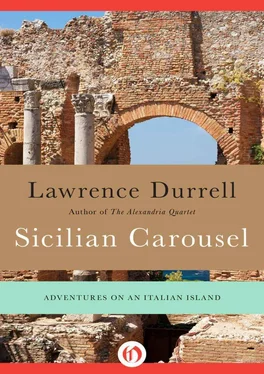Lawrence Durrell - Sicilian Carousel - Adventures on an Italian Island
Здесь есть возможность читать онлайн «Lawrence Durrell - Sicilian Carousel - Adventures on an Italian Island» весь текст электронной книги совершенно бесплатно (целиком полную версию без сокращений). В некоторых случаях можно слушать аудио, скачать через торрент в формате fb2 и присутствует краткое содержание. Год выпуска: 2012, Издательство: Open Road Media, Жанр: Путешествия и география, на английском языке. Описание произведения, (предисловие) а так же отзывы посетителей доступны на портале библиотеки ЛибКат.
- Название:Sicilian Carousel: Adventures on an Italian Island
- Автор:
- Издательство:Open Road Media
- Жанр:
- Год:2012
- ISBN:нет данных
- Рейтинг книги:4 / 5. Голосов: 1
-
Избранное:Добавить в избранное
- Отзывы:
-
Ваша оценка:
- 80
- 1
- 2
- 3
- 4
- 5
Sicilian Carousel: Adventures on an Italian Island: краткое содержание, описание и аннотация
Предлагаем к чтению аннотацию, описание, краткое содержание или предисловие (зависит от того, что написал сам автор книги «Sicilian Carousel: Adventures on an Italian Island»). Если вы не нашли необходимую информацию о книге — напишите в комментариях, мы постараемся отыскать её.
Sicilian Carousel: Adventures on an Italian Island — читать онлайн бесплатно полную книгу (весь текст) целиком
Ниже представлен текст книги, разбитый по страницам. Система сохранения места последней прочитанной страницы, позволяет с удобством читать онлайн бесплатно книгу «Sicilian Carousel: Adventures on an Italian Island», без необходимости каждый раз заново искать на чём Вы остановились. Поставьте закладку, и сможете в любой момент перейти на страницу, на которой закончили чтение.
Интервал:
Закладка:
Inevitably our book discussions found a place in the general context of all the others — of the readings of Indian texts, of the amateur attempts upon the world of breathing exercises, attempts at meditation. It was an idyllic time spent in blue weather on the green grass of the ancient Abbey; I had been elected what the Chinese called (so she said) “a friend of the heart.” And indeed so had Piers who made frequent summer appearances in order to advise her about her house and add afterthoughts to his own beautiful house in Lapithos. It was the last summer before the Fall — before the political situation, envenomed by neglect and stupidity, burst into flame and turned into a fully-fledged insurrection. For a longish while, however, the manifestations of the crisis remained quite moderate — for the Cypriot Greeks were most peaceable people and they knew that the British people in the island were not the architects of the policies which ruled it. But with the arrival of troops and the gradually mounting toll of incidents and counter incidents tempers wore thin and at last wore out altogether. All our hopes of a peaceful and productive life in this paradisiacal place went up in smoke.
As the problems connected with the buying of her land, and permission to build upon it, proved somewhat long — for the Government, if honest, was somewhat dilatory — Piers persuaded Martine to build an encampment of mock Indonesian huts on her land where she could live during the summer and see her house emerge from the scrub and arbutus of the little promontory. The island, we discovered, produced an excellent rush matting in several thicknesses and the heaviest proved tough and weatherproof for walls and roofing. The idea was miraculous in its simplicity — the local carpenters could run up a whole room in a day. It was like playing at dolls’ houses; for a couple of hundred pounds Martine built herself a temporary matting house with room enough to invite her summer guests, with kitchens and bathrooms — everything, for there was water on the land which Piers could later draw off for the big house.
Intoxicated by this discovery, she at once launched into what gradually turned into a miniature village almost, with a main square from which all the huts led off, with grouped water points and drainage and septic tanks. Piers, the born architect and planner, was lost in admiration and envy at this freestyle building and often, when he ran into problems with the big house, would swear and ask her why the devil she could not live forever in a matting house, repairing it at little cost as fast as it deteriorated? There were times when she almost agreed, when the big house seemed too solid and too consciously thought out — for at heart, like all the family of Gainsboroughs, Martine was something of a gipsy. The instinct had perhaps worn itself out a little — though her father, old Sir Felix, had expressly chosen a traveling profession — diplomacy — which sent him to a new country every few years. She had been marked by this wandering life, and she spoke with eloquence and insight of what it had meant to her and to her brother, in terms of actual domicile, to inhabit buildings which were beautifully appointed but in which nothing belonged to one — everything belonged to the Office of Works, even the choice plate. One brought one’s books and pictures into play to be sure, but an embassy for all its comfort could never be a home. But this was how she knew Rome, Moscow, Buenos Aires: and this was how she had become a linguist. But her childhood had been full of this strange sense of not belonging; lying awake at night listening for the official Rolls which wheeled on to the gravel after midnight, bringing their parents back from some boring reception — so fatigued by their social duties that they could hardly exchange a word and often even dined alone in silence; simply to recover from the deep wasting fatigue of a life which was a mirror life. Only at holiday times did things seem to come alive, but then the cottage in Devon was owned , it was theirs like the mill in Ireland and the flat in Capri. The subtle difference cut very deep; but was it really necessary to own the house one lived in in order to feel happy? Surely there was something false about the proposition? Then perhaps it was simply the artifices and limitations of the diplomatic life? She had begun to look upon diplomats as kindly lampreys gesturing in the dark pools of the profession among the fucus and drifting weeds of protocol and preciousness. Nor was this really fair — for Sir Felix was far from being a mountebank, hence no doubt his frequent relegation to quite minor missions in the role of a lifesaver or life-giver — to ginger them up, or to create new openings as he had in Latin America. But Martine in a dim incoherent way wanted a different life: and here it was.
These long-lost events, which my memory had so carelessly and capriciously stored away, came back to me now with full force as we munched our stale pizzas and drank heartening draughts of Chianti; it was a memory touched off by the fact that here, like in Cyprus, we were seated on the hot time-worn stones of a vanished Greek civilization, in the drowsy heat of the Mediterranean sun. Sacked temples, quake-shattered citadels, ruined fortresses, exhausted wells … the old tragic pattern was the same, a long barren lesson in history which seeks always for the stable and is undermined by the shifts and betrayals of man’s consciousness itself as reflected in the ebb and flow of temporal events. And yet — what was he not capable of, man? Any benevolent tyrant who could enjoy a thirty-year rule was capable of launching humanity on a new vector, on to the peaceful pursuits of husbandry and art and science. Then, abruptly, like the explosions from some Etna of the mind, the whole thing overturned and both guilty and innocent were drenched in blood. One would have to believe very deeply in Nature to expect a meaning to emerge from all this senseless carnage; if one were really truthful one could not help but see her as some frightful demented sow gobbling up her own young at every remove. But Martine, underneath the spoilt playgirl or fashion plate, was hunting after some absolute belief in the Tightness of Process — and only the philosophy of the Indians seemed to offer that.
Nearby in a mulberry tree, half-dead and desiccated by the sun, there was a great concourse of ravens or rooks — I could not tell which. They were like Methodist parsons holding one of their amusing conventions in some Harrogate hotel. They submitted with modest attention to the theological addresses of two obvious elders of the church. Almost they made notes. We watched them with wonder and curiosity, trying to imagine what could be the subject of their grave colloquy. In vain. After a long moment, and in response to no immediately visible signal, the whole company wheeled suddenly up into the sky and performed several slow and rather irresolute gyrations — as if they were trying to locate a beam of light or sound, an electrical impulse which would orient them. They wheeled several times in a most indecisive manner; then suddenly a breakaway group detached itself and headed northward, and the rest, their minds set at rest, wheeled into line and followed them. Direction assured they broke into several clusters the better to talk; one could hear their grave club chatter as they diminished in the distance, leaving the field clear for the drone of bees and the sharp stridulations of the cicada. I was dozing. I was nearly asleep in fact. It was a good way to start off, with a siesta in Sicily.
It had become very hot up there in the dusty foothills, hotter than Provence at this hour in summer. The light wind which had cooled us all morning had subsided and the whole of nature, it seemed, was itself subsiding into the death-like composure of the siesta hour. Sensible men in such places preferred to sleep in a shuttered room until almost sunset when the coolness once more started and when a walk upon the Gorso and a Cinzano at a cafe became imperatives. I lay for a while in the shade with my eyes closed, recalling another anecdote which had emerged from the casual conversation of Martine. Once upon a time, as children in a foreign capital, she and her brother had been sent to play with the children of a fellow diplomat whose little girl and boy were about the same age as they were. They were accordingly decanted by their nurse at the Japanese Embassy where the two Japanese children waited for them with friendly politeness. Introductions once effected, their small hosts led them to their playroom — a large studio with high bright windows. “You must not forget that we, like all English children, had a playroom stuffed with toys, from rocking horses to bicycles and model cars — just about everything. But when we entered the Japanese playroom we were struck dumb, we were thunderstruck. There was nothing in it save for one solitary object on the windowsill against the studio window. This was a great white ship, a fully rigged Japanese galleon in full sail. Just that and nothing more in this spotless shining room. We stood still in front of our Japanese hosts feeling suddenly terribly ashamed.”
Читать дальшеИнтервал:
Закладка:
Похожие книги на «Sicilian Carousel: Adventures on an Italian Island»
Представляем Вашему вниманию похожие книги на «Sicilian Carousel: Adventures on an Italian Island» списком для выбора. Мы отобрали схожую по названию и смыслу литературу в надежде предоставить читателям больше вариантов отыскать новые, интересные, ещё непрочитанные произведения.
Обсуждение, отзывы о книге «Sicilian Carousel: Adventures on an Italian Island» и просто собственные мнения читателей. Оставьте ваши комментарии, напишите, что Вы думаете о произведении, его смысле или главных героях. Укажите что конкретно понравилось, а что нет, и почему Вы так считаете.











